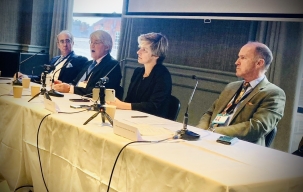Key dates
Latest
-
PodcastsDefence & Security — 2 Oct 2024
Podcast: CMEC at CPC24 pt.2: Does 'Stop The Boats' start in the Sahel?


Nouakchott
3.6 million
Democratic Islamic republic headed by president
President Mohamed Ould Ghazouani
Prime Minister Mr Mohamed Ould Bilal
November 23rd
H.E Mr BA Samba Mamadou
Embassy of Mauritania, Carlyle House, 235-237 Vauxhall Bridge Road, London, SW1V 1EJ
H.E Mr Colin Wells (*Appointed to be British High Commissioner for Eswatini from August 2024)
British Embassy Nouakchott, Rue 42-163, B.P. 213, Tevragh Zeina, Nouakchott, Mauritania
A nation of the Sahel
Geographically, Mauritania is one of the 10 countries that are - in total or in part - in the Sahel, the vast region that stretches along the southern edge of the Sahara Desert from the Atlantic in the west to the Red Sea in the east, wedged between the desert to the north and tropical forests and savannah to the south. For the most part, this belt has a tropical semi arid climate.
Founding member of ECOWAS
Mauritania is one of the 15 founder members of the Economic Community of West African States (ECOWAS). ECOWAS was established in May 1975 by the Treaty of Lagos to promote economic trade, cooperation and self-reliance. The organisation seeks to harmonise agricultural policies and to facilitate the free movement of people, services and capital among members, that include Nigeria, Niger, Sierra Leone and Mali. Cape Verde joined in 1977,
Colonisation
European traders started moving in on Mauritania in the 1400s, initially establishing trading posts along the country’s coastline. France declared Mauritania a protectorate in 1904, and an overseas French territory 42 years later. Mauritania declared independence in 1960.
Coups and politics
In 1978, a coup toppled the country’s first president, Moktar Ould Daddah. There then followed a series of intermittent coups and failed coups over the next four decades, with the last one coming in 2007 with the overthrow of President Abdallahi and his replacement by the coup-leader General Mohamed Ould Abdel Aziz. The 2019 presidential elections saw the peaceful transfer of power from Abdel Aziz, who decided not to run, to his successor, Mohamed Ould Ghazouani who became the country’s 9th President.
In January 2023, Ex-president Abdel Aziz went on trial accused of illicit enrichment during his time in power, along with 10 other former government officials and businessmen. The case continues.
Constitutional changes
Mauritania's parliament has one chamber, the National Assembly, made up of 157 members who stand for re-election in single-seat constituencies every 5 years. Its legislature was bicameral until August 2017 when the upper house, the Senate, was abolished following a referendum on its continued existence.
Western Sahara
In 1979, Mauritania gave up any claim to any Western Sahara territory and decided to support the claims to self-determination of the Sahrawi people as represented by the Polisario Front. Morocco subsequently annexed formerly Mauritian-occupied territory in Western Sahara.
A dependable Western ally and oil producer
Mauritania is seen by the West as a reliable ally in the fight against Islamist militancy in the Sahel region, including groups such as Al Qaeda.
Mauritania is rich in mineral resources, particularly iron and ore. It started offshore oil and gas production in 2006.
